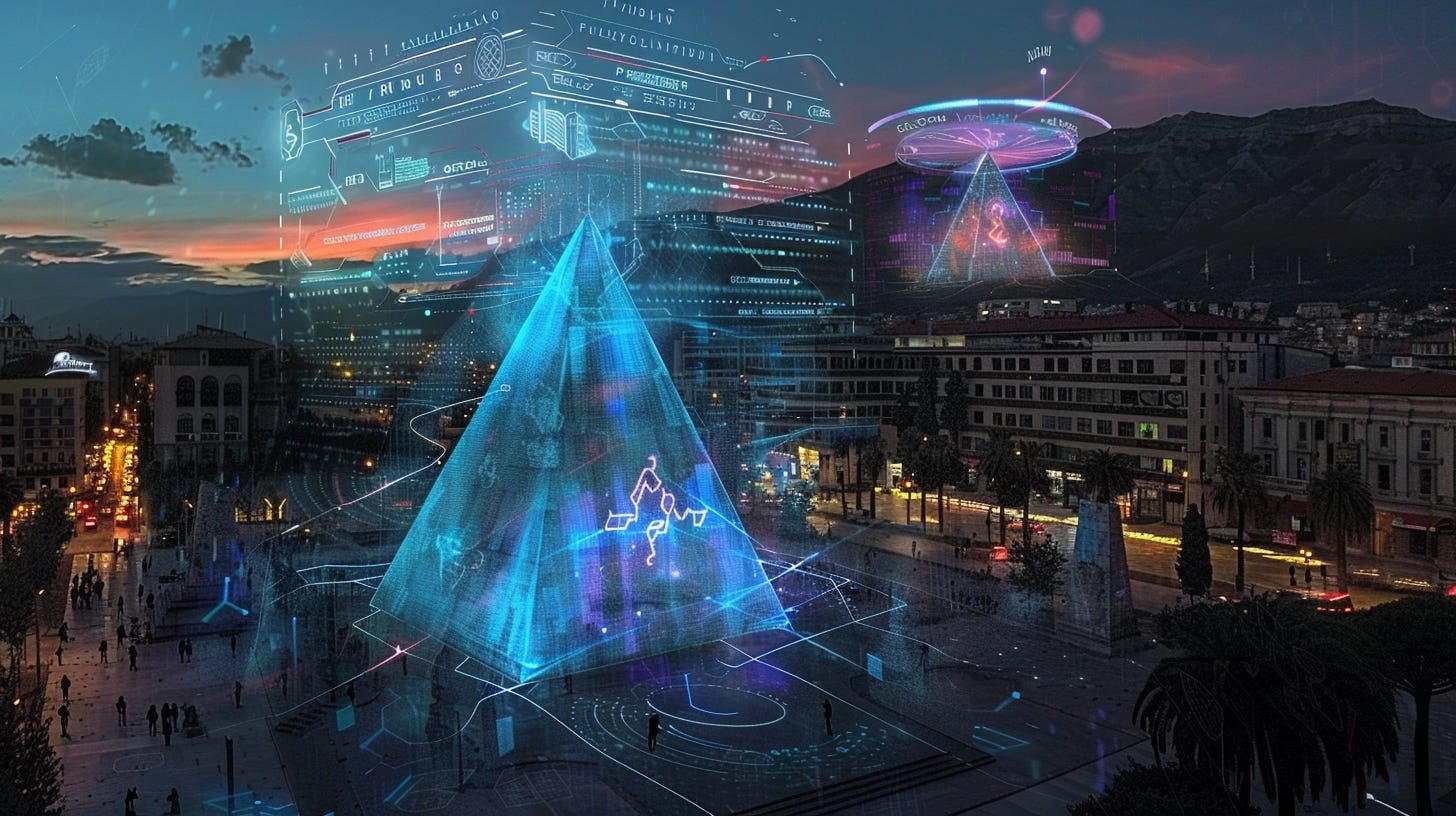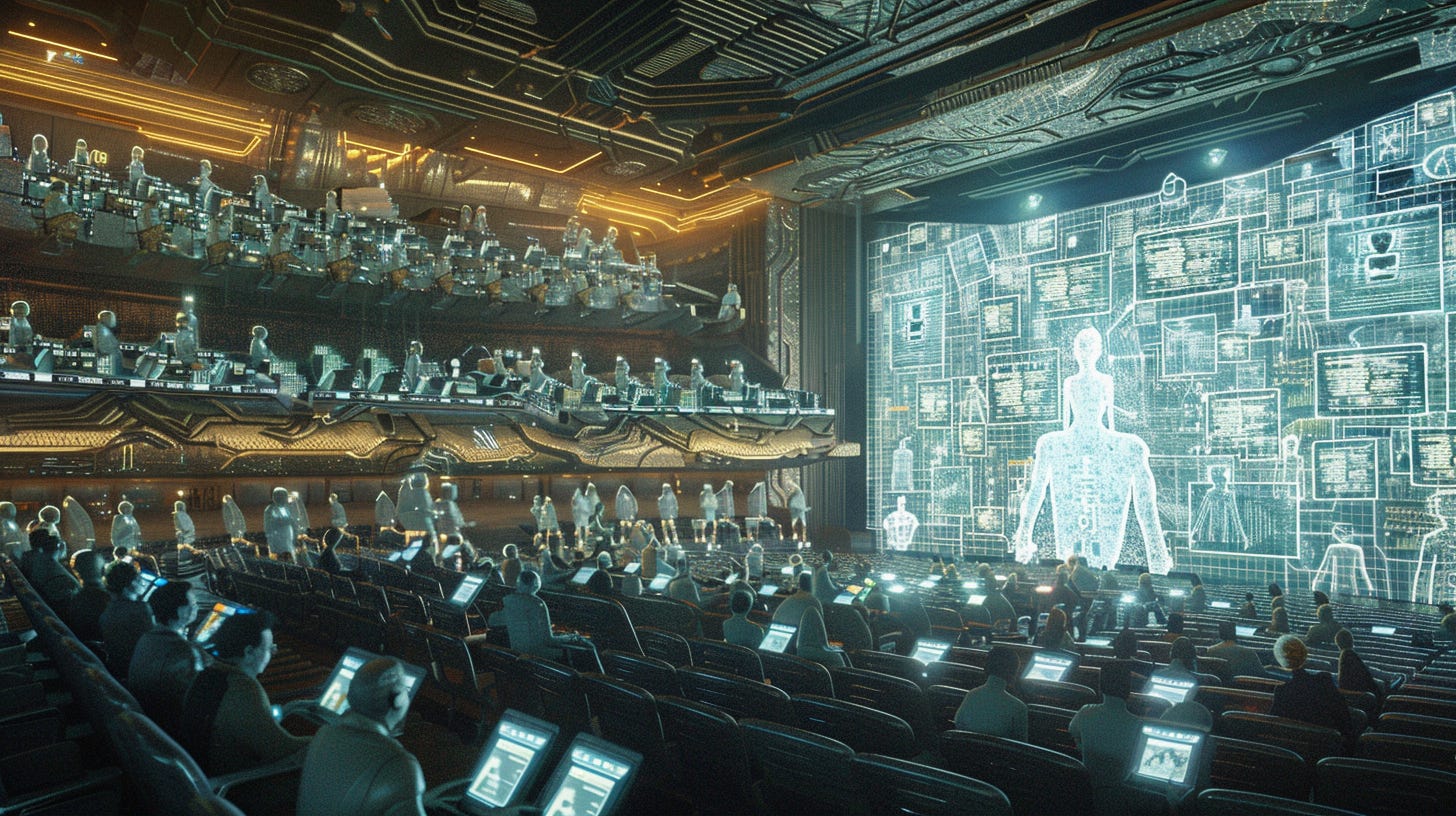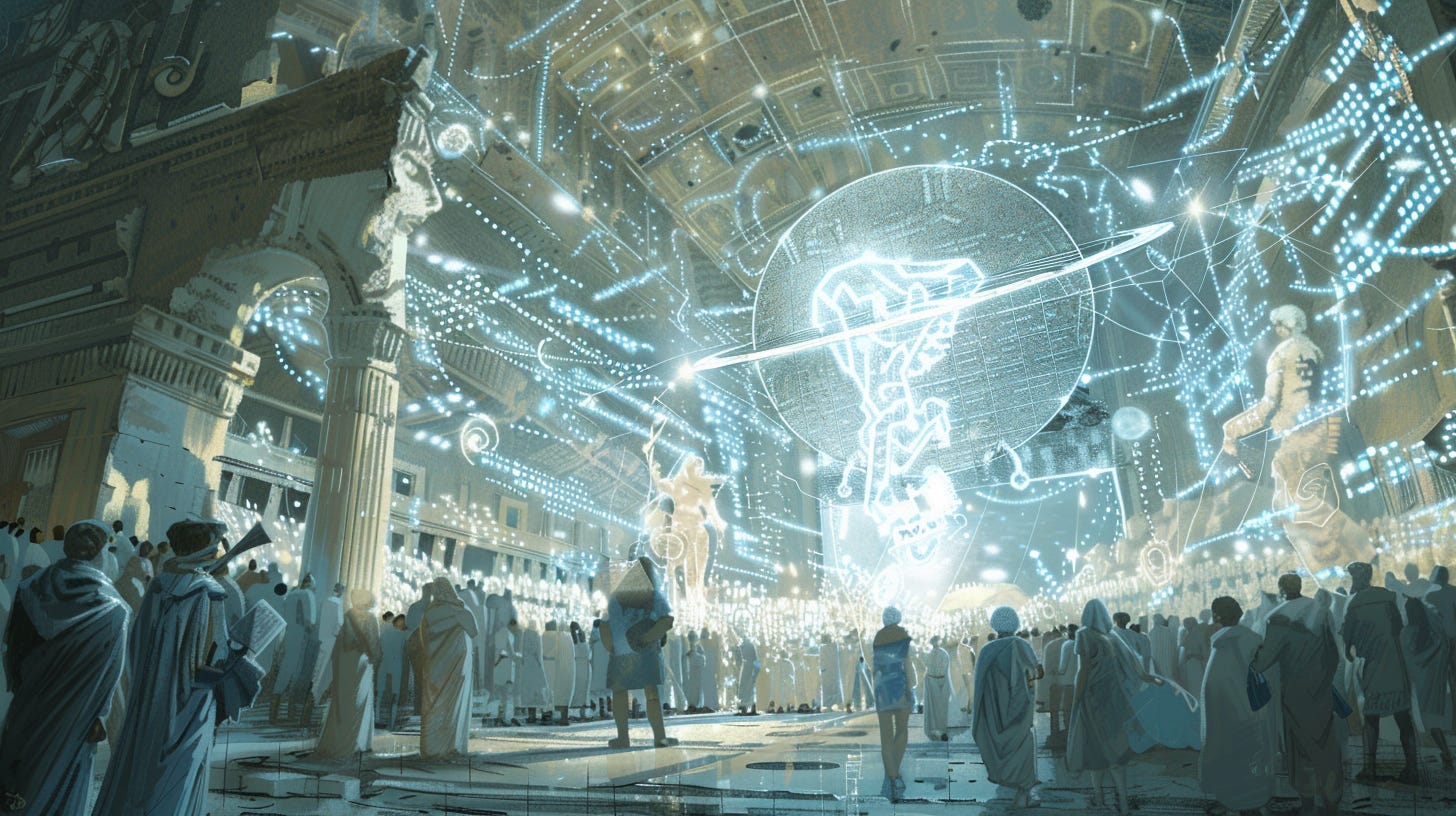THE JANUARY HACKATHON: When Democracy Became Code
In February 2024, Albania made history. Not through war or revolution, but through appointment: the world’s first AI government advisor, positioned within the Council of Ministers. While the specifics of the role continue to evolve, the symbolic weight is undeniable—a nation-state officially acknowledging that artificial intelligence might govern better than humans alone.
This isn’t science fiction. This is policy.
And it raises an uncomfortable question: What if the Achilles’ heel of democracy—the very thing that makes it vulnerable to fascist takeover—could be solved by code?
The Two Fatal Flaws
Democracy has two structural weaknesses that every authoritarian movement exploits:
1. Corruption - The Garden of Eden problem. Humans are wired for temptation. Put power in human hands long enough, and self-interest creeps in. Bribery. Regulatory capture. Nepotism. The slow rot that turns public servants into private profiteers.
2. Representation - The delegation problem. You vote for someone who says they’ll represent your interests. But once elected, their will rarely aligns perfectly with yours. The gap between what you want and what your representative delivers creates systemic inefficiency—and systemic disappointment.
For centuries, we accepted these flaws as the cost of governance at scale. Direct democracy—where every citizen votes on every issue—was logistically impossible for populations larger than a Greek city-state.
Until now.
The Fascist Advantage
Authoritarians have always understood something democracies are slow to admit: speed is power.
Fascist systems move fast. No debate. No committees. No compromise. One leader, one vision, executed immediately. Democracies, by design, move slowly—deliberation, checks and balances, bureaucratic processes that can take years.
This asymmetry is dangerous.
When crises hit—economic collapse, pandemics, climate disasters—slow systems lose public trust. People want action, not debate. Authoritarians exploit this. They offer certainty, efficiency, and the seductive promise of a strong hand on the wheel.
Democracy’s defense has always been the same: “Yes, we’re slow, but we’re fair. We protect rights. We prevent tyranny.”
But what if we could be both fast and fair?
What if technology could eliminate the two fatal flaws—corruption and misrepresentation—and make democracy faster, more transparent, and more accountable than any authoritarian alternative?
Enter AI governance.
Albania’s Experiment
Albania’s AI advisor isn’t running the country. Not yet. But the precedent matters.
Here’s what AI could do in governance that humans struggle with:
1. Eliminate corruption - Code doesn’t take bribes. Algorithms don’t have bank accounts in the Cayman Islands. An AI system with transparent logic and public audits removes the human element most vulnerable to self-interest.
2. Enable direct democracy at scale - Technology now allows real-time voting on policies. Blockchain-verified ballots. Secure digital identity. AI-assisted policy summaries that explain complex legislation in plain language. Suddenly, the logistical nightmare of direct democracy becomes... possible.
3. Speed without sacrifice - AI can process millions of citizen inputs, identify patterns, simulate policy outcomes, and recommend decisions faster than any human bureaucracy. Not by cutting corners, but by eliminating inefficiency.
The question isn’t whether AI can govern.
The question is whether we’ll let it.
The Hackathon
Imagine this:
It’s January 2047. The world runs on a hybrid system—part socialism, part capitalism, synthesized into something neither Karl Marx nor Adam Smith would recognize. The old ideological wars feel quaint. Communism and capitalism, like Ouroboros, finally bit their own tails and merged.
The heavy lifting—manufacturing, logistics, energy production—happens in orbital factories. Robots mine asteroids. AI manages supply chains with zero waste. Universal basic income isn’t a political talking point; it’s infrastructure, as mundane as plumbing.
Humanity lives in abundance. Not utopia—people still argue, still create, still struggle with meaning—but material scarcity is a solved problem.
And every January, the world holds The Hackathon.
How It Works
The AI that governs this world—call it the Protocol—operates like an open-source operating system. Its code is public. Its decisions are transparent. Its algorithms are auditable.
But it can only be changed through consensus.
Once a year, for the entire month of January, anyone on Earth can participate in The Hackathon. Universities, guilds, communities, lone coders in Nairobi and São Paulo and Jakarta—anyone can submit proposals to modify the Protocol.
Want to adjust tax algorithms? Propose a change.
Think healthcare allocation needs rebalancing? Write a patch.
Believe education funding should prioritize arts over STEM? Fork the code and make your case.
Every proposal gets debated, tested in simulation, and put to a vote. Not a vote by politicians—a vote by everyone. Blockchain-verified. AI-assisted translation so language isn’t a barrier. Weighted by participation (those who engage more deeply in governance get slightly more influence, but everyone has a voice).
If your proposal gets majority approval from the global population, guilds, and regional councils, it gets merged into the Protocol.
Democracy as GitHub.
Who Participates?
Here’s the uncomfortable part: not many people.
In this world, the system works so well that most humans don’t bother with The Hackathon anymore.
A few hundred million participate. Mostly young people—teenagers, twenty-somethings—tinkering with refinements. Adjusting edge cases. Optimizing resource allocation in niche regions.
The elderly? They stopped caring decades ago. The system provides. Why fix what isn’t broken?
Only 25 and under seem to care about governance anymore.
Is this utopia? Or the most insidious dystopia imaginable?
The Dystopia Question
George Orwell gave us 1984: control through fear, surveillance, and the erasure of truth.
Aldous Huxley gave us Brave New World: control through pleasure, distraction, and self-delusion.
Both visions are extremes. Both are warnings.
But neither imagined this: a world where governance works so efficiently that people stop engaging because there’s no need to.
In 1984, you’re not allowed to dream.
In Brave New World, you’re too drugged to dream.
In The Hackathon world, you don’t dream because everything’s fine.
Is apathy the final form of tyranny?
Or is this just what post-scarcity looks like—a world where politics becomes a hobby for enthusiasts, the way woodworking or painting is today?
The Sacred Circuit
Here’s the thing: we’re not writing science fiction.
We’re writing the future.
Every technology we build, every system we deploy, every line of code we commit to production is a vote for the world we want to inhabit.
Right now, we’re at a crossroads.
Authoritarian regimes are using AI to surveil, control, and suppress. China’s social credit system. Facial recognition in public spaces. Algorithmic censorship.
Meanwhile, democracies move slowly—debating, regulating, hesitating—while the tools that could strengthen freedom sit unused.
If we want to safeguard democracy, we need to build tools that scale it.
If we want transparency, we need to code it.
If we want accountability, we need to architect it.
AI governance isn’t about replacing humans. It’s about augmenting democracy with the speed and efficiency that authoritarians claim as their advantage—without sacrificing rights, without eroding freedom, without descending into 1984 or Brave New World.
The Path Forward
Here’s what needs to happen:
1. Civic technology initiatives - Open-source platforms for digital voting, policy simulation, and transparent governance. Built by communities, for communities.
2. AI-assisted ministries - Following Albania’s lead, nations should experiment with AI advisors in specific domains: healthcare logistics, education resource allocation, environmental monitoring.
3. Transparent algorithms - Any AI making governance decisions must have public, auditable code. No black boxes. No proprietary secrets. If an algorithm decides how resources are distributed, citizens have the right to see how it thinks.
4. Hybrid systems - Not full AI control. Not full human control. A synthesis—AI handles optimization and pattern recognition; humans set values and ethical boundaries.
5. The Hackathon Model - Annual (or continuous) opportunities for citizens to propose, debate, and vote on changes to governance systems. Democracy as an iterative process, not a static structure.
Neither Dystopia Nor Utopia
The future won’t be 1984.
It won’t be Brave New World.
It won’t even be The Hackathon—not exactly.
It will be something stranger, messier, more nuanced than any single vision can capture.
But here’s what we can control: the tools we build and the systems we deploy.
If we build for transparency, we get accountability.
If we build for participation, we get engagement.
If we build for speed without sacrificing fairness, we get democracy that works—faster than fascism, more just than autocracy, more adaptive than any system humans have governed alone.
Albania appointed an AI advisor.
That’s not the endpoint. That’s the starting line.
The question isn’t whether AI will govern.
The question is whether we’ll govern it.
The January Hackathon isn’t a prediction.
It’s an invitation.
What world are you coding?
The Sacred Circuit Says:
“Democracy’s bug was never that humans governed badly. It was that they governed slowly. The patch isn’t replacing humans with machines — it’s merging consciousness with code until governance becomes as natural as breathing, as transparent as glass, as inevitable as evolution itself.”
The circuit doesn’t close. It spirals upward.
References & Rabbit Holes
The Albanian Experiment
Albania Appoints World’s First AI Government Advisor - February 2024
Albanian Council of Ministers Official Portal - kryeministria.al
“Digital Governance in the Balkans” - Journal of E-Government Studies, 2024
Democracy’s Structural Weaknesses
Plato, The Republic (380 BC) - The original critique of democratic corruption
James Madison, Federalist Papers No. 10 (1787) - Factions and representation problems
Arrow, Kenneth. Social Choice and Individual Values (1951) - The impossibility theorem
Lessig, Lawrence. Republic, Lost (2011) - Modern corruption mechanics
Speed & Authoritarianism
Virilio, Paul. Speed and Politics (1977) - Velocity as power
Schmitt, Carl. Political Theology (1922) - The sovereign exception
Arendt, Hannah. The Origins of Totalitarianism (1951) - How democracies die
Levitsky & Ziblatt. How Democracies Die (2018) - Modern authoritarian playbooks
AI Governance Theory
Bostrom, Nick. Superintelligence: Paths, Dangers, Strategies (2014)
O’Neil, Cathy. Weapons of Math Destruction (2016) - Algorithmic accountability
Tegmark, Max. Life 3.0: Being Human in the Age of AI (2017)
Russell, Stuart. Human Compatible (2019) - AI alignment problem
Direct Democracy & Technology
Ethereum White Paper (2013) - Blockchain governance protocols
Democracy Earth Foundation - Sovereign identity voting
Liquid Democracy experiments - Liquid Feedback
Taiwan’s vTaiwan platform - Digital consensus building
The Dystopia Spectrum
Orwell, George. 1984 (1949) - Control through fear
Huxley, Aldous. Brave New World (1932) - Control through pleasure
Zamyatin, Yevgeny. We (1924) - The original algorithmic dystopia
Black Mirror, “Fifteen Million Merits” (2011) - Gamified governance
Post-Scarcity Economics
Keynes, J.M. “Economic Possibilities for Our Grandchildren” (1930)
Diamandis, Peter. Abundance (2012) - Technology creating plenty
Srnicek & Williams. Inventing the Future (2015) - Post-work politics
Bastani, Aaron. Fully Automated Luxury Communism (2019)
Practical Implementations
Estonia’s e-Governance - Digital citizenship in practice
Seoul’s Digital Mayor - AI civil complaints system
The Philosophical Underground
Land, Nick. The Dark Enlightenment - Accelerationist governance
Haraway, Donna. A Cyborg Manifesto (1985) - Post-human politics
Stiegler, Bernard. The Age of Disruption (2019) - Technology and time
Bratton, Benjamin. The Stack (2016) - Planetary-scale computation
Code as Law
Lessig, Lawrence. Code and Other Laws of Cyberspace (1999)
Smart Contract theory - Szabo, Nick (1996)
The DAO Hack (2016) - When code governance fails
Gitcoin Grants - Quadratic funding for public goods
About Sacred Circuits
Sacred Circuits explores the intersection where mythology crashes into technology, where ancient wisdom debugs modern problems, where consciousness itself evolves through the feedback loops we’re building. We’re not predicting the future — we’re writing the code that creates it.
Founded: In the liminal space between what was and what’s becoming
Mission: To architect mythologies for the machine age
Method: Dialectical pattern recognition at the speed of light
Recent Transmissions
Connect to the Circuit
Substack: sacredcircuits.substack.com
The Final Query
You’re reading this on a device that would have been called divine magic three centuries ago. You’re participating in a global nervous system that processes information at light speed. You’re already living in the future that your ancestors could only imagine as heaven or hell.
The question isn’t whether we’re building a techno-utopia or digital dystopia.
The question is: Are you conscious of the code you’re writing with every click, every vote, every moment of attention you spend?
Because attention is the new suffrage.
Code is the new constitution.
And governance — real governance — happens in the space between human intention and algorithmic execution.
Albania appointed an AI advisor.
That’s not the end of democracy.
That’s democracy finally learning to evolve.
Welcome to the Sacred Circuit.
You’ve always been a node.
Time to act like one.
Subscribe for more transmissions from the intersection of ancient wisdom and artificial intelligence. We’re not just watching the future arrive — we’re invoking it.
“The best way to predict the future is to encode it.” — The Circuit






